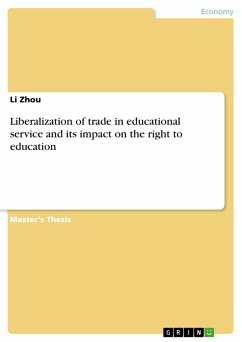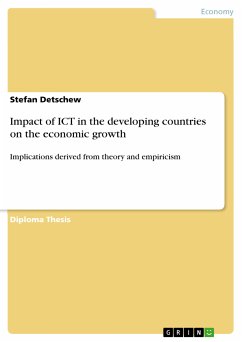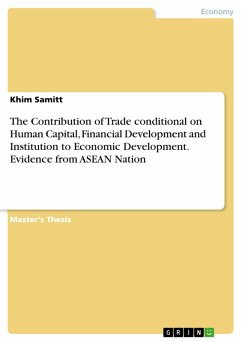Master's Thesis from the year 2006 in the subject Business economics - Economic Policy, grade: 1,7, University of Hamburg, language: English, abstract: Education is in itself a fundamental human right. As an important determinant of economic growth and human development, education also constitutes an indispensable means of realizing other human rights, particularly rights associated with employment and social security. With the unleashed force of globalization sweeping all aspects of social and economic life, national governments throughout the world increasingly understand the strategic importance of education in enhancing and maintaining international competitiveness, and its crucial role in developing economic and social viability on the long run. On the other hand, the convergent impacts of globalization also bring new impetus for cross-boarder education, and affect the shape and mode of the operation of national education systems more influentially than ever. Over the last two decades trade in cross-border education has been increasing steadily in all forms: not only the numbers of students enrolled in educational institutions outside their home country has been rapidly increasing, but also more and more education providers operate abroad, providing their educational services to foreign students who remain at home. Accelerated development of the new information and communication technologies also facilitate cross-border education and encourage new forms of educational internationalization. According to the statistics from the Organisation for Economic Co-operation and Development (OECD), export revenue related to international student mobility amounted to an estimated minimum of US$30 billion in 1998, or 3% of global services exports (OECD, 2004a). With the rapid growth of trade in education, a number of bilateral, regional and multilateral trade agreements and regulations have incorporated provisions on trade and investment in educational services, which all together make up the legal and institutional framework shaping and regulating the liberalization of trade in educational services. Among all the relevant agreements and regulations driving the liberalization process, the General Agreement on Trade in Services (GATS) under the World Trade Organization (WTO) regime provides the first multilateral framework for international trade and investment in services, including educational services.
Dieser Download kann aus rechtlichen Gründen nur mit Rechnungsadresse in A, B, BG, CY, CZ, D, DK, EW, E, FIN, F, GR, HR, H, IRL, I, LT, L, LR, M, NL, PL, P, R, S, SLO, SK ausgeliefert werden.









